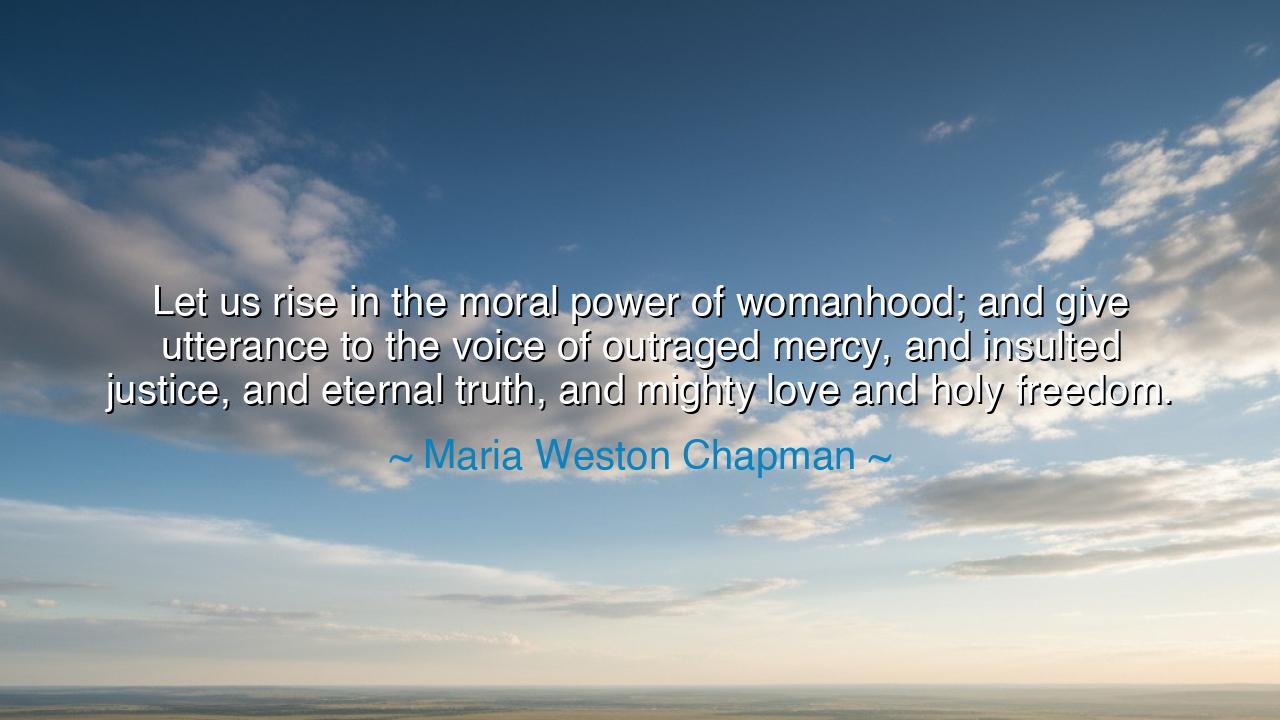
Let us rise in the moral power of womanhood; and give utterance
Let us rise in the moral power of womanhood; and give utterance to the voice of outraged mercy, and insulted justice, and eternal truth, and mighty love and holy freedom.






Host: The room was filled with a quiet, profound stillness, the lamp casting a soft light across the space. Outside, the world had slipped into night, the peaceful hum of the evening barely reaching them. Jeeny sat at the table, her fingers lightly tracing the rim of her cup, her expression thoughtful. Jack, standing near the window, gazed out at the darkened world, his posture relaxed but his mind clearly absorbed in reflection. The air between them was calm, but there was an unspoken understanding that a deeper conversation was about to unfold.
Jeeny: (breaking the silence, her voice calm but filled with purpose) “I came across something by Maria Weston Chapman today that really made me think. She said, ‘Let us rise in the moral power of womanhood; and give utterance to the voice of outraged mercy, and insulted justice, and eternal truth, and mighty love and holy freedom.’ What do you think about that?”
Jack: (pauses, his voice thoughtful) “It’s a powerful call to action, isn’t it? She’s urging women to rise, not just for the sake of their own rights, but for something much greater—mercy, justice, truth, and freedom. What stands out to me is how she connects these universal ideals to the moral power of womanhood. It’s not just about activism or fighting for rights—it’s about embracing a kind of moral authority that comes from the deepest principles of love and justice.”
Jeeny: (nodding slowly) “Exactly. It’s about recognizing that women have an innate strength to speak out against injustice, to demand freedom, and to stand up for what’s right. Chapman is calling on women to not only advocate for themselves, but to become the voices for the oppressed, the marginalized, and those whose rights are denied. Her words imply that women possess a unique moral clarity that can bring about change and transformation.”
Host: The stillness in the room deepened, as their words began to take on a more profound meaning. Jack turned slightly toward Jeeny, his expression softening as he considered the broader implications of Chapman’s call. Outside, the world had quieted, but inside, the conversation had evolved into something more reflective—about power, justice, and the role women play in shaping a better world.
Jack: (his voice quieter now, more reflective) “What strikes me is how Chapman doesn’t just talk about action, but about moral power. It’s about standing firm in the face of injustice, not with anger, but with the strength of truth, mercy, and love. She’s calling for women to rise with the understanding that their voices carry the weight of these eternal principles, and that is where their power lies—in the truth they speak, and the change they can create.”
Jeeny: (softly) “Yes, it’s about righteousness—acting not out of anger or frustration, but out of a deep sense of what is right and just. Chapman is asking women to channel their strength into something greater than themselves, to become the bearers of truth and justice in the world. It’s a call to move beyond personal gain and stand up for what is needed to build a more just and compassionate society.”
Jack: (nodding slowly, his voice more assured) “And I think it’s also about solidarity—Chapman is asking women to speak not only for themselves but for those who cannot speak for themselves, to advocate for mercy, for freedom, and for justice. That’s the power of collective action, of rising together, not just for a personal cause, but for the good of the greater whole.”
Jeeny: (smiling gently) “Exactly. Her words are an invitation for women to embrace their collective strength, to rise with courage and conviction, knowing that their voices can create a ripple of change. The moral power of womanhood is not just about the individual, but about the collective ability to speak truth and demand justice for all.”
Host: The quiet in the room felt profound now, a shared understanding settling between them. Outside, the world had quieted to a peaceful stillness, but inside, the conversation had become more than just a reflection on Chapman’s words—it was a realization that moral power lies in speaking truth, in standing up for what is right, and in advocating for justice and freedom for all. Jeeny and Jack had discovered a deeper truth—that the strength of women lies not just in their voices, but in their ability to rise for something greater, to shape a world that is more just and compassionate.
Jack: (smiling softly, his voice more assured) “It’s a reminder that strength is not just about physical power, but about the moral courage to stand up for what is right, for justice, and for freedom. When women rise in that way, they not only change their own lives—they change the world.”
Jeeny: (nodding warmly) “Yes, and in that rise, they become a beacon of hope for others. Their voice, grounded in truth, mercy, and love, can create a world that is more just, more compassionate, and more equal for everyone.”
Host: The world outside had quieted, but inside, the room was filled with understanding. Jeeny and Jack had uncovered the powerful truth in Chapman’s words—that the moral power of womanhood lies not just in advocating for one’s rights, but in rising to speak for justice, truth, and freedom for all. The quiet of the night outside seemed to reflect the strength of that realization.






AAdministratorAdministrator
Welcome, honored guests. Please leave a comment, we will respond soon